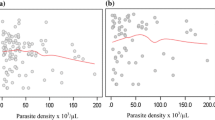Abstract
To test the hypothesis that the magnitude of plasma triglyceride changes could be related to the severity of falciparum malaria, we performed a retrospective case-control study from January 1999 to December 2000 among hospitalized patients with fever who were returning to France from the tropics. Plasma triglycerides were measured in patients with severe falciparum malaria (n=13), mild falciparum malaria (n=169), non-falciparum malaria (n=20) and controls (n=55). Triglyceride level was significantly higher in the malaria group than in controls [mean values were 2.17±1.43 mmol/l versus 1.30±0.70 mmol/l, respectively (P<0.0001)]. Triglyceride level was also significantly higher in severe than in mild malaria [4.78±1.93 mmol/l versus 1.94±1.11, respectively (P<0.00001)]. Hypertriglyceridemia (>1.80 mmol/l) was noted in all the patients with severe malaria, compared to 37% of patients with mild disease (P<0.001). Although further studies are needed, these results define the relevance of hypertriglyceridemia as an indicator of the severity of falciparum malaria.
Similar content being viewed by others
References
Badiaga S, Barrau K, Parola P, Brouqui P, Delmont J (2002) Contribution of nonspecific laboratory test to the diagnosis of malaria in febrile travelers returning from endemic areas: value of hypocholesterolemia. J Travel Med 9:117–121
Baptista JL, Vervoort T, Van der Stuyft P, Wery M (1996) Changes in plasma lipid levels as a function of Plasmodium falciparum infection in Sao Tome (in French). Parasite 3:335–340
Das BS, Patnaik JK, Mohanty S, Mishra SK, Mohanty D, Satpathy SK, Bose TK (1993) Plasma antioxidants and lipid peroxidation products in falciparum malaria. Am J Trop Med Hyg 49:720–725
Djoumessi S (1989) Serum lipids and lipoproteins during malaria infection. Pathol Biol (Paris) 37:909–911
Faucher JF, Ngou-Milama E, Missinou MA, Ngomo R, Kombila M, Kremsner PG (2002) The impact of malaria on common lipid parameters. Parasitol Res 88:1040–1043
Mizock BA (2000) Metabolic derangements in sepsis and septic shock. Crit Care Clin 16:319–36
Mohanty S, Mishra SK, Das BS, Satpathy SK, Mohanty D, Patnaik JK, Bose TK (1992) Altered plasma lipid pattern in falciparum malaria. Ann Trop Med Parasitol 86:601–606
Nilsson-Ehle I, Nilsson-Ehle P (1990) Changes in plasma lipoproteins in acute malaria. J Intern Med 227:151–155
Onongbu IC, Onyeneke EC (1983) Plasma lipid changes in human malaria. Tropenmed Parasitol 34:193–196
Vernes A, Dei Cas E, Dutoit E, Maurois P, Gentilini JL, Biguet J (1980) Changes of serum lipoproteins during the course of human malaria (in French). Pathol Biol (Paris) 28:457–460
World Health Organization (2000) Severe falciparum malaria. Trans R Soc Trop Med Hyg 94[Suppl 1]:1–90
Author information
Authors and Affiliations
Corresponding author
Rights and permissions
About this article
Cite this article
Parola, P., Gazin, P., Patella, F. et al. Hypertriglyceridemia as an indicator of the severity of falciparum malaria in returned travelers: a clinical retrospective study. Parasitol Res 92, 464–466 (2004). https://doi.org/10.1007/s00436-003-1012-5
Received:
Accepted:
Published:
Issue Date:
DOI: https://doi.org/10.1007/s00436-003-1012-5




